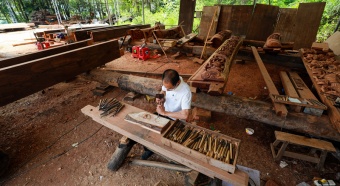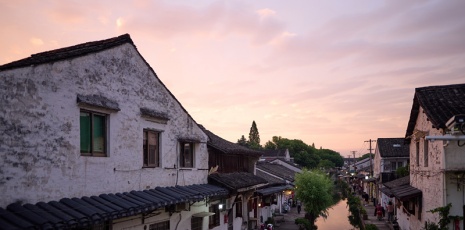
Residents whose homes were swept away by a flood in late April in Mathare slum, Kenya’s capital Nairobi, find temporary shelter at a nearby school on Wednesday. Otiato Opali / China Daily
It was around 11 pm when Josephine Atieno was woken up by screams from neighbors, and she found floodwaters had entered her house, almost submerging it. She was so frightened that she got up quickly, holding her three children, and rushed out of the room to higher ground.
"The village was full of screams such as 'flood is coming, get up quickly', and 'we are going to die'," she said. She kept running in the dark and when she arrived at a public hall of a nearby primary school — about half a kilometer from her home, which is located on the bank of a river — she found the hall had already been packed with hundreds of people.
"I felt so scared and cold, I could not sleep at all that night," she said. "I just lay on the ground with wet clothes and spent the night cold and hungry."
Almost two weeks have passed since her house was swept away, and like many other people who survived the flooding at the Mathare slum in Kenya's capital Nairobi, Atieno did not know how long she would have to stay in the hall, which had been turned into a temporary shelter.
"Our houses were swept away by the flood," she said. "We have lost everything."
Although the local government provided some help, she said it was not enough. The displaced people have been provided with one free meal comprising rice and beans at noon every day. Besides the lack of food and clean water, she said they are also in dire need of toilet paper, soap, diapers for children and mosquito nets.
Mathare slum, where some half a million people live, is one of the worst-affected areas in the recent flooding. More than 235,000 people in Kenya have been displaced and living in various temporary shelters, according to the Kenyan government.
The government has declared Friday as a public holiday in honor of the flood victims. Almost 260 people have died, while 75 are still missing.
Working together
Kenyan President William Ruto on Wednesday said Friday will mark the start of a major tree-planting program to reduce the impact of climate change, which is believed to have contributed to the floods. He urged Kenyans to work together to plant at least 200 million trees on Friday.
Ruto also announced the reopening of all schools in the country on Monday after the meteorological department predicted rains would subside in the coming days.
Schools were scheduled to reopen on April 29, but it was postponed by the Ministry of Education due to flooding across the country.
The Kenyan government is in cooperation with the World Health Organization and the Kenya Red Cross Society to accommodate flood victims by setting up camps across the nation.
Joe Mbalu, deputy secretary-general of Kenya Red Cross Society, said the society has set up some camps in Nairobi, which can be used as shelters for the displaced people. People will be provided with sleeping mats, blankets and other essential items at these camps.
Boniface Matindi, head teacher of Mathare North Primary School in the Mathare slum, said the entire school was submerged in late April, damaging most of its 25 classrooms. While the floodwaters have receded, the classrooms are full of broken chairs and desks.
"Most of the classrooms are not safe and need reconstruction," he said. The toilets are blocked and the thick mud carried by floodwaters needs to be cleared before the school can be reopened, he said.
Otiato Opaliin Nairobi, Kenya, contributed to this story.










